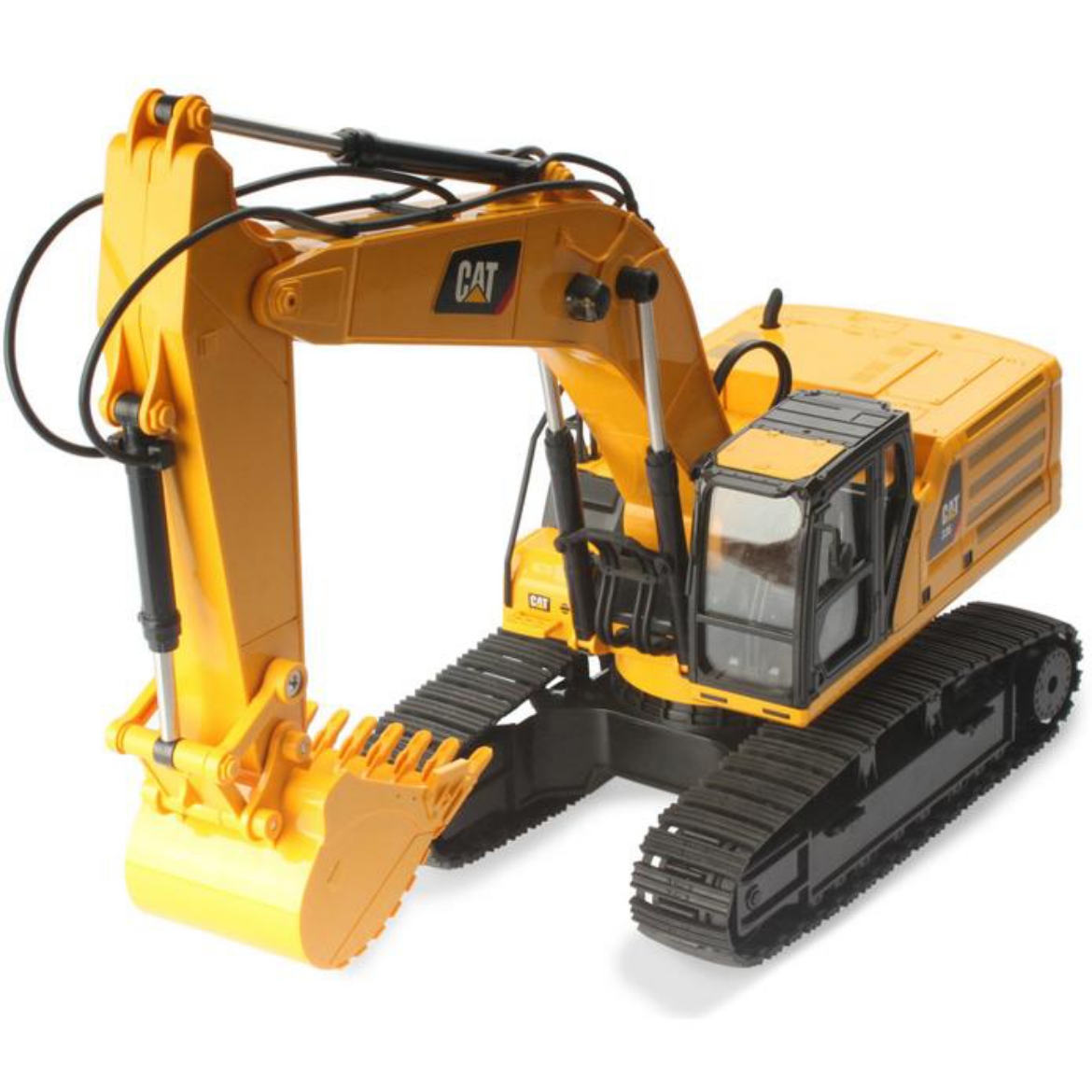Comprehending How Excavator Works and Its Influence On Performance
Excavators play an important role in building and construction and mining procedures, depending on a complex interaction of mechanical and hydraulic systems. Their ability to do a range of jobs rests on both their design and the modern technology incorporated within. Recognizing these components can considerably influence operational efficiency and performance. As advancements proceed to reshape the market, one must think about just how these adjustments will certainly influence future practices and efficiency.
The Essentials of Excavator Mechanics

The Role of Hydraulic Solutions in Excavators
At the heart of excavator procedure lies the hydraulic system, which plays an essential function in powering the device's features and activities. This system utilizes pressurized hydraulic liquid to move energy, allowing different activities such as excavating, swinging, and training. By taking advantage of the concepts of hydraulics, excavators can do tasks with impressive precision and force, enhancing general functional efficiency.The hydraulic system contains vital parts, including shutoffs, pumps, and cyndrical tubes, which interact to regulate the circulation and instructions of the liquid. When the driver engages the controls, the hydraulic fluid is guided to particular cyndrical tubes, converting the operator's commands into physical movement. This device permits for responsive and smooth activities, which are essential in building and construction and excavation atmospheres. double e volvo rc excavator. The efficiency of the hydraulic system straight affects the efficiency and flexibility of the excavator, making it a crucial aspect in contemporary excavation processes
Key Elements of an Excavator
Recognizing the vital elements of an excavator is important for realizing just how this effective device operates. An excavator contains numerous considerable components, consisting of the undercarriage, residence, container, boom, and arm. The undercarriage gives security and flexibility, typically including tracks or wheels to browse various surfaces. The residence consists of the engine and hydraulic systems, permitting the operator to control motion and power the maker. The boom expands from your house, enabling upright reach, while the arm attaches to the pail, helping with excavating and lifting operations.Additionally, the taxicab houses the operator, furnished with controls for specific maneuvering. Each of these elements plays a vital function in the excavator's total capability, adding to its performance and effectiveness on building and construction sites. Recognizing these components aids in optimizing and keeping excavator efficiency, making certain tasks are finished safely and successfully.
Add-on Versatility and Its Benefits
Accessory adaptability is a vital element of excavators, making it possible for operators to switch in between different devices customized for specific jobs. This flexibility not just boosts task performance but likewise adds to cost-effectiveness by decreasing the need for multiple devices. Understanding the different types of add-ons offered can considerably affect the overall performance and capability of an excavator on task websites.
Sorts of Attachments
While excavators are primarily identified for their excavating capacities, their true flexibility lies in the vast selection of attachments available. These attachments enhance the excavator's functionality, allowing it to perform different jobs beyond excavation. Common add-ons consist of pails (for excavating and scooping), hydraulic thumbs (for understanding products), and augers (for drilling holes) Grapples are utilized for moving and handling particles, while rippers can separate difficult surfaces. Various other specialized add-ons, such as trenchers and rakes, allow excavators to adapt to certain task requirements. This variety not only enhances the equipment's energy throughout different fields, consisting of construction, demolition, and landscaping, yet additionally enables drivers to tailor their devices to meet certain project needs efficiently.
Boosted Job Effectiveness
Optimizing work effectiveness is a key advantage of using various excavator accessories. Various accessories enable an excavator to do multiple tasks without requiring to switch over equipment, conserving important time and labor. Using a hydraulic hammer can damage concrete while a bucket accessory can dig deep into soil, allowing a smooth workflow. This versatility reduces downtime connected with tools modifications and enhances efficiency on-site. Furthermore, specialized attachments improve accuracy in jobs such as grading or landscaping, resulting in better results. The capability to adjust to numerous task needs not just streamlines operations but likewise lessens the need for added equipment, guaranteeing that jobs are finished promptly and properly. Overall, attachment flexibility significantly adds to raised work performance in excavation job.
Cost-Effectiveness and Versatility
Cost-effectiveness is a substantial benefit of making use of functional excavator add-ons. These accessories enable a single excavator to execute numerous jobs, lowering the requirement for additional machinery and labor - double e volvo rc excavator. By changing in between containers, hammers, and grapples, drivers can deal with various tasks, from excavating to demolition, thus taking full advantage of tools usage. This versatility not only reduces operational costs but additionally lessens downtime related to transforming devices. Furthermore, the ability to customize excavators with specialized accessories boosts efficiency, as they can efficiently handle varied jobs according to job demands. In conclusion, the combination of cost-effectiveness and flexibility in excavator attachments adds to enhanced operational efficiency and resource allocation in building and construction and excavation tasks

Advanced Modern Technology in Modern Excavators
Modern excavators are increasingly geared up with sophisticated innovation that transforms excavation processes. Automation simplifies procedures, while improved gas efficiency decreases operational costs. Furthermore, clever control systems boost precision and security, noting a go now substantial advancement in excavation devices.
Automation in Excavation Processes
As excavation technology progresses, automation has actually arised as a critical part in boosting performance and precision on job sites. Modern excavators are geared up with innovative automated systems that help with tasks such as grading, excavating, and trenching with minimal operator intervention. These systems use sensing units, GPS, and artificial intelligence formulas to ensure exact positioning and depth control, considerably minimizing the margin for mistake. Furthermore, automation allows operators to focus on strategic decision-making as opposed to manual controls, resulting in improved productivity overall. Such innovations not just enhance operations but additionally boost safety by minimizing human error in intricate operations. As a result, the assimilation of automation in excavation procedures represents a significant innovation in construction innovation, driving the market in the direction of greater effectiveness and efficiency.
Boosted Gas Efficiency
Developments in modern technology have actually additionally brought about significant enhancements in gas performance for contemporary excavators. Modern machines are geared up with innovative engines that optimize power outcome while minimizing gas consumption. These engines make use of ingenious combustion technologies, such as turbocharging and direct gas shot, to enhance efficiency and performance. Furthermore, lightweight products in building lower general weight, enabling less power expenditure during operation. The intro of variable rate controls makes it possible for drivers to readjust engine efficiency according to details tasks, further minimizing gas usage. Consequently, these enhancements not just lower functional costs but also add to ecological sustainability by minimizing discharges. Overall, enhanced gas effectiveness in excavators is an essential advancement that strengthens performance and economic viability in the building and construction industry.
Smart Control Systems
While drivers navigate progressively intricate job sites, smart control systems in excavators have actually arised as necessary tools for improving effectiveness and precision. These innovative modern technologies utilize sensing units and formulas to check various criteria such as tons weight, surface conditions, and operational performance. By instantly adjusting hydraulic functions, wise systems maximize equipment performance, bring about improved efficiency and decreased endure parts. In addition, drivers profit from instinctive interfaces that provide real-time comments and diagnostics, enabling informed decision-making. This integration of innovation not just streamlines operations yet also reduces human mistake, adding to safer workplace. As the construction market remains to evolve, smart control systems will play an essential role in shaping the future of excavator performance and efficiency.
Enhancing Functional Performance With Excavators
Excavators play a vital check out here function in boosting functional effectiveness throughout numerous construction and excavation jobs. Their convenience enables numerous tasks, including digging, training, and product handling, which streamlines process and minimizes the demand for added tools. With effective hydraulic systems, excavators can carry out sturdy jobs with precision, considerably reducing the time required to total jobs. The combination of innovative modern technology, such as GPS and automated controls, even more enhances their procedure, making it possible for drivers to accomplish better precision and minimize product waste. Additionally, modern excavators are designed to consume much less gas and lessen discharges, adding to both cost financial savings and environmental sustainability. By making use of excavators efficiently, building and construction teams can boost performance, satisfy task deadlines, and improve general website administration. This multifunctionality and performance make excavators important tools in the modern-day building and construction landscape.
The Future of Excavators in Building And Construction and Mining Industries
As the building and mining industries advance, the future of excavators is positioned for significant improvement driven by technical innovation and changing functional demands. Breakthroughs in automation and synthetic knowledge are reshaping excavator capabilities, enabling enhanced accuracy and effectiveness in procedures. Autonomous excavators are arising, decreasing the need for human treatment and lessening the danger of accidents.Moreover, the combination of telematics and IoT innovation makes it possible for real-time monitoring of equipment efficiency and anticipating upkeep, optimizing uptime. Eco-friendly designs, including electric and hybrid models, are gaining grip, straightening with sustainability objectives within the industry.Additionally, making use of innovative products and lighter designs boosts gas efficiency while preserving efficiency criteria. As these fads progress, excavators will play a crucial role in fulfilling the increasing demands for efficiency and safety and security in construction and mining, eventually changing operational landscapes.
Often Asked Concerns
How Do Weather Influence Excavator Efficiency?

Weather problems considerably influence excavator efficiency, as rainfall and mud can prevent grip and stability, while extreme temperature levels might influence hydraulic systems. Operators should adapt to these variables to assure suitable capability and safety and security during operations.
What Security Procedures Should Operators Adhere To While Making Use Of Excavators?
Safety and security procedures for excavator operators consist of wearing appropriate personal safety devices, conducting pre-operation inspections, making certain proper interaction with ground workers, maintaining a secure range from overhead risks, and sticking to well-known operational protocols to avoid accidents.
Exactly How Frequently Should Excavators Be Kept for Optimal Performance?
Excavators need to be kept routinely to ensure peak efficiency, generally every 250 operating hours or as defined by the producer. Routine checks enhance dependability, avoid unanticipated break downs, and expand the life-span of the tools.
What Is the Average Life-span of an Excavator?
The typical life-span of an excavator usually varies from see this here 10,000 to 15,000 hours of operation. Elements affecting longevity include upkeep methods, running conditions, and the quality of the machine itself, influencing total efficiency and efficiency.

Can Excavators Operate on Uneven Surface Properly?
Excavators can run successfully on unequal terrain due to their verbalized styles and adjustable tracks. These attributes allow them to maintain security and traction, allowing reliable procedure in difficult settings generally come across in building and construction and landscaping jobs. Each of these parts plays an important role in the excavator's total performance, contributing to its performance and efficiency on building websites. Maximizing work efficiency is a main benefit of utilizing numerous excavator add-ons. While drivers navigate increasingly complex work websites, clever control systems in excavators have actually arised as essential tools for enhancing efficiency and accuracy. Excavators play an essential function in enhancing operational efficiency across different building and excavation projects. Advances in automation and artificial knowledge are improving excavator abilities, allowing for boosted accuracy and effectiveness in operations.